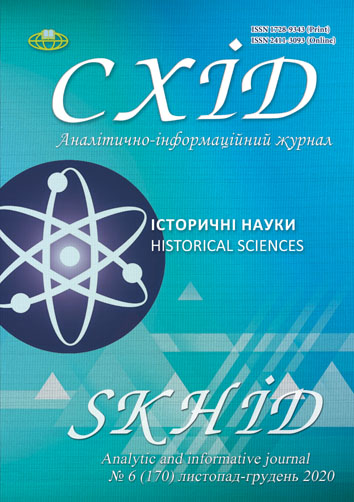DEVELOPMENT OF UTOPIAN THOUGHT IN ANCIENT CHINA (EASTERN ZHOU ERA): HISTORICAL AND TYPOLOGICAL ANALYSIS
DOI:
https://doi.org/10.21847/1728-9343.2020.6(170).219303Keywords:
"golden age", Confucius, Mo-tzu, utopia, utopian ideal, utopianism, uchroniaAbstract
The article is devoted to the formation of utopian thought in the history of ancient China. The chronological framework of the topic covers the period of the Eastern Zhou era (770 - 256 BC). The historical preconditions for the emergence of utopia and its features are revealed. Emphasis is placed on the affinity of utopian thought of the region with the ethical and philosophical currents of the time, the peculiarities of worldview. The author draws attention to the relevance of this topic, which is explained by the existing debate in modern humanities about the existence of utopia and utopianism in ancient China. The idea of the presence of certain elements of utopian thought, starting with Confucius and Mo-Tzu, whose works later became the basis for the development of utopia in the future. The methodological basis of the work revealed the main roots of the utopian ideal, to substantiate the characteristics of utopia in line with socio-political thought China. Generic signs of utopia were revealed. It is shown that these features are the product of a socio-political crisis (the fragmentation of the state into warring kingdoms, social contradictions of property and legal nature between social strata). Hence the idea of the "golden age" as an idealized past, the opposite of the real (modern) rolling situation. Weak political power causes the emergence in utopia of the image of a strong wise (and perfectly wise) ruler, who is helped to rule by wise and pious people. In support of this, the article quotes Mo-Tzu, who assesses reality with a degree of pessimism and, putting forward an altruistic idea of universal love, does not believe in its realization. As a result, among the typological features of utopian thought in ancient China are criticism, idealization of the "ideal" past, compensatory (utopia inspires hope) and timeless (ukhronia).Downloads
References
Vasilyev, L. S. (1993). Istoriya Vostoka [History of the East]. Vol 1. Moscow: Vysshaya shkola. Retrieved from https://www.litmir.me/br/?b=95 (In Russian).
Konfucij (2016). Lun' Yuj (Besedy i suzhdeniya) [Lun Yu (Conversations and Judgments)]. Moscow: Zlataya Artel. Retrieved from https://www.newacropol.ru/Alexandria/philosophy/Philosofs/Konphutsii/sugdenia/ (In Russian).
Martynov, А. S. (1987). Konfucianskaya utopiya v drevnosti i srednevekov'e [Confucian utopia in antiquity and the middle ages]. Kitajskie socialnye utopii – Chinese social utopias (рр. 10-58). Moscow: Nauka (In Russian).
Martynov, D. E. (2011). Sushchestvovala li v Kitae utopiya? [Was there a utopia in China]. Retrieved from http://vphil.ru/index.php?option=com_content&task=view&id=445&Itemid=52 (In Russian).
Martynov, D. E. (2010). «Utopiya» Zapada i «Velikoe Yedinenie» Kitaya: k probleme recepcii i evolyucii terminologii [The "Utopia" of the West and the "Great Unity" of China: Towards the Problem of Reception and Evolution of Terminology]. Voprosy filosofii, 7: 137–148 (In Russian).
Miroshnikov, O. A. & Masaev, M. V. (2018). Dve storony Konfucianskoj kulturnoj paradigmy [Two sides of the Confucian cultural paradigm]. Uchenye zapiski Krymskogo federal'nogo universiteta imeni V. I. Vernadskogo. Filosofiya. Politologiya. Kulturologiya – Scientific notes of the V.I.Vernadsky Crimean Federal University. Philosophy. Political science. Culturology, Vol. 4 (70), 2, 16–25. Retrieved from http://sn-philcultpol.cfuv.ru/wp-content/uploads/2018/12/002miroshnikov.pdf [in Russian].
Mo-czy. (1972). Mo-czy [Mo-tzu]. Drevnekitajskaya filosofiya. Sobranie tekstov. Vol. 1. Moscow: Mysl. Retrieved from http://religa.narod.ru/biblio/motzy.htm (In Russian).
Rykov, S. Yu. (2013). Nekotorye osobennosti moistskoj logiki [Some features of Moist logic]. Retrieved from https://cyberleninka.ru/
Cukanova, V. E. (2016). Utopiya kak rekonstrukciya mificheskogo «Vremeni Ono» (na primere drevnekitajskih i drevnegrecheskih utopij Konfuciya i Gesioda) [Utopia as a reconstruction of the mythical "It Time" (on the example of the ancient Chinese and Greek utopias of Confucius and Hesiod)]. Zapad i Vostok: filosofiya, religiya, kul'tura - West and East: philosophy, religion, culture, (рр. 91-97). St.Petersburg: Sankt-Peterburgskoe filosofskoye obshchestvo. Retrieved from http://anthropology.ru/ru/text/cukanova-ve/utopiya-kak-rekonstrukciya-mificheskogo-vremeni-ono-na-primere-drevnekitayskih-i (In Russian).
Chertkova, E. L. (1993). Utopiya kak tip soznaniya [Utopia as a type of consciousness]. Obshchestvennye nauki i sovremennost' – Social sciences and modernity, 3, (рр. 71-81) (In Russian).
Downloads
Published
How to Cite
Issue
Section
License
Copyright (c) 2020 Vera Okorokovа

This work is licensed under a Creative Commons Attribution-NonCommercial-NoDerivatives 4.0 International License.
1. Authors bear responsibility for the accuracy of facts, quotations, numbers and names used.
2. Manuscripts are not sent back.
3. The publisher does not always agree with the authors' opinion.
4. The authors reserve the right to authorship of the work and pass the first publication right of this work to the journal under the terms of a Creative Commons Attribution-NonCommercial-NoDerivatives 4.0 International License. This license allows others to distribute (copy) the published work for non-commercial purposes, provided there is mandatory attribution to its authors and a link to the first publication in our journal.
5. The authors have the right to conclude separate supplement agreements that relate to non-exclusive work distribution in the form in which it has been published by the journal (for example, to upload the work to the online storage of the journal or publish it as part of a monograph), provided that the reference to the first publication of the work in this journal is included.

